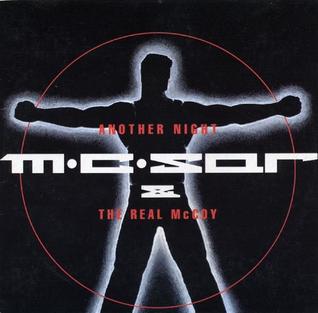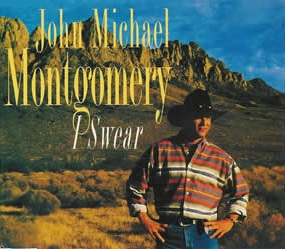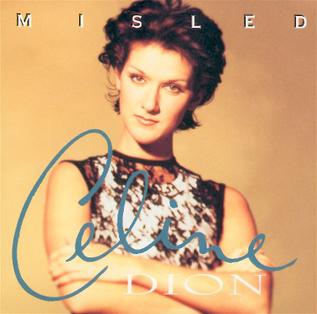
"December, 1963 " is a song originally performed by the Four Seasons, written by original Four Seasons keyboard player Bob Gaudio and his future wife Judy Parker, produced by Gaudio, and included on the group's album Who Loves You (1975).

"Another Night" is a song by German Eurodance and pop music project Real McCoy. The single is featured on their hit album Another Night (1995), which was the American release of the project's second album, Space Invaders. The song was written and produced in Germany by Juergen Wind and Frank Hassas (Quickmix) in 1993 under the producer team name Freshline. It was released in Europe on 12 July 1993 by Hansa Records and two music videos were produced, directed by Nigel Dick and Angel Garcia.

"Turn the Beat Around" is a disco song written by Gerald Jackson and Peter Jackson, and performed by American actress and singer Vicki Sue Robinson in 1976, originally appearing on her debut album, Never Gonna Let You Go (1976). Released as a single, the song went to #10 on the Billboard pop charts, and #73 on the Billboard soul chart. The song earned Robinson a Grammy nomination for Best Female Pop Vocal Performance. The track also went to number one on the Billboard disco chart for four weeks. "Turn the Beat Around" is considered a disco classic and is featured on many compilation albums.

"You Should Be Dancing" is a song by the Bee Gees, from the album Children of the World, released in 1976. It hit No. 1 for one week on the American Billboard Hot 100, No. 1 for seven weeks on the US Hot Dance Club Play chart, and in September the same year, reached No. 5 on the UK Singles Chart. The song also peaked at No. 4 on the Billboard Soul chart. It was this song that first launched the Bee Gees into disco. It was also the only track from the group to top the dance chart.

"Star Wars Theme/Cantina Band" is a song recorded by Meco, taken from the album Star Wars and Other Galactic Funk. It hit number one on the Billboard Hot 100 on October 1, 1977, holding on to the spot for two weeks and peaked at no. 7 on the UK Singles Chart, remaining in the charts for nine weeks. The single was certified Platinum by the Recording Industry Association of America, having sold a million units.

"I Swear" is a song written by Gary Baker and Frank J. Myers that became a hit for American country music artist John Michael Montgomery in 1993, and for American R&B group All-4-One in 1994.

"Another Sad Love Song" is a song by American singer-songwriter Toni Braxton. Written and produced by Daryl Simmons and Babyface, featuring additional production from L.A. Reid, it was released as the lead single and its opening track from Braxton's self-titled debut album (1993) on June 11, 1993, by LaFace Records and Arista Records. Lyrically, it talks about Braxton complaining that every song played on the radio is a reminder of her ex-boyfriend.

"Misled" is a song recorded by Canadian singer Celine Dion for her third English-language studio album, The Colour of My Love (1993). It was released as the second single from the album on 11 April 1994 by Columbia Records/Epic Records. The song was written by Peter Zizzo and Jimmy Bralower and produced by Ric Wake. "Misled" topped the US Billboard Dance Club Songs chart and reached number four in Canada. It also peaked at number 15 on the UK Singles Chart and number 23 on the Billboard Hot 100. Its music video was directed by Randee St. Nicholas.

"Don't Go Breaking My Heart" is a 1976 duet by English musician Elton John and English singer Kiki Dee. It was written by John with Bernie Taupin under the pseudonyms "Ann Orson" and "Carte Blanche", respectively, and intended as an affectionate pastiche of the Motown style, notably the various duets recorded by Marvin Gaye and singers such as Tammi Terrell and Kim Weston. John and Taupin originally intended to record the song with Dusty Springfield, but ultimately withdrew the offer; Springfield's partner Sue Cameron later said this was because she was too ill at the time.

"Please Forgive Me" is a song by Canadian rock musician Bryan Adams. It was released in October 1993 by A&M Records as the only single and bonus track from his first greatest hits compilation album, So Far So Good (1993). The single reached numbers seven and three on the US Billboard Hot 100 and Cash Box Top 100, and number two on the Billboard Adult Contemporary chart. In the United Kingdom, "Please Forgive Me" peaked at number two on the UK Singles Chart. It is his only Australian number-one single not written for a motion picture, and it also topped the charts of Belgium, Canada, France, Ireland, Norway, and Portugal. The accompanying music video was directed by Andrew Catlin and filmed in a recording studio, featuring a dog.

"Runaway Love" is a song by American R&B/pop group En Vogue, released in September 1993 by Eastwest Records as the first single from the group's extended play (EP) Runaway Love. After the huge success of their second album, Funky Divas (1992), the single was released. It was written and produced by Thomas McElroy and Denzil Foster. Group members Cindy Herron and Terry Ellis share lead vocals, Dawn Robinson leads on the bridge, and spoken intro is by Maxine Jones. Elroy and Foster contributed vocals and spoken rap, their known as the alias FMob group. In the US, the song reached numbers 51 and 43 on the Billboard Hot 100 and Cash Box Top 100.

"Can't Get Enough of Your Love, Babe" is a song written, recorded, and produced by American musician Barry White. Released in June 1974 as the first single from his third album, Can't Get Enough (1974), the song topped the US Billboard Hot 100 and Billboard R&B charts. It became one of White's signature tunes and achieved gold record status in the US. It was also his second American chart-topper, after "Love's Theme".

"Faith (In the Power of Love)" is a song by Zambian-born singer Rozalla. It was released in April 1991 as the third single from her second album, Everybody's Free (1992). The single first charted in the UK in April 1991, reaching No. 65. The single was re-released in November of that year after the success of her previous single, "Everybody's Free (To Feel Good)", peaking this time at No. 11. The song met with similar success throughout the rest of Europe, although some countries skipped this release in favour of her next single "Are You Ready to Fly". The song did not see a release in the US until 1993, when it peaked at No. 4 on the Billboard Hot Dance Club Play chart. The song was used for the soundtrack of the 1991 Vanilla Ice-starring film Cool as Ice.

"You Never Love the Same Way Twice" is a song by Zambian-born singer Rozalla, released in October 1994 as the third single from her second album, Look No Further (1995), and later also included on her Best Of album. The song reached number 12 on the Scottish Singles Chart and number 16 on the UK Singles Chart, during a five-week chart run. It was a minor hit in Germany and Iceland, and peaked at number 61 on the Eurochart Hot 100 in November 1994. The single was also released in the United States in 1995 as the attendant single of the US edition of her second album, reaching number 11 on the Billboard Hot Dance Club Play chart. In 2005, Rozalla re-recorded and re-released the track for a German label.

"Little Bird" is a song composed and recorded by Scottish singer-songwriter Annie Lennox. Taken from her debut solo album, Diva (1992), it was produced by Stephen Lipson and released in February 1993 by RCA and BMG as a double A-side with "Love Song for a Vampire" in Ireland, the United Kingdom, and various other European countries. In other territories, "Little Bird" was released alone.

"Touch Me (All Night Long)" is a 1984 song by American singer Fonda Rae and American band Wish. It was a minor hit for Rae and the band, and was featured in the 1985 slasher film A Nightmare on Elm Street 2: Freddy's Revenge. In the original, it is alternately spelled as "Tuch Me (All Night Long)" or simply just "Tuch Me".

"Baby Baby" is a song by Italian band Corona, released in February 1995 by ZYX Music as the second single from their debut album, The Rhythm of the Night (1995). The song, written by Francesco Bontempi and Antonia Bottari, was originally a hit in 1991 for Italian project Joy & Joyce as "Babe Babe". Both tracks were produced by Bontempi under his Lee Marrow guise. It was very successful on the singles charts around the world, peaking at number-one in Italy, and on the RPM Dance/Urban chart in Canada. In the UK, it peaked at number five for two weeks. Two different music videos were produced for the song.

"Mr. Wendal" is a song by American rap group Arrested Development from their debut album, 3 Years, 5 Months and 2 Days in the Life Of... (1992). In Europe and Australia, it was issued as a double A-side with their following single, "Revolution" and released in December 1992 by EMI and Chrysalis. In the United States, the song peaked at number six on the Billboard Hot 100, selling 500,000 copies and earning a gold certification. Worldwide, it reached the top 10 in Australia, Ireland, New Zealand, and the United Kingdom. The song's music video was directed by Keith Ward and received a nomination at the 1994 Soul Train Music Awards.
"So Much in Love" is a song written by George Williams, Billy Jackson, and Roy Straigis. It was originally performed by Williams's American soul vocal group the Tymes and was released in the summer of 1963 on Cameo Parkway Records, which produced many pre-Beatles hits of the 60s such as The Twist. It quickly became The Tymes' first hit single, topping the US Billboard Hot 100 singles chart on August 3, 1963, and remaining there for one week, as well as peaking at No. 4 on the Hot R&B Singles chart.

"Everybody's Free (To Feel Good)" is a song by Zambian-born Zimbabwean singer Rozalla, released in August 1991 by label Pulse-8 as the second single from her second album, Everybody's Free (1992). The song was written by Nigel Swanston and Tim Cox, and produced by Band of Gypsies. It had been a staple in the clubs in Ibiza and Mallorca in the summer of 1991, and hordes of recovering ravers were delighted to find "that tune about being free to feel good and stuff" was available to buy back home. Upon its release, the song reached number two in Belgium, the Netherlands and Spain, while entering the top 10 in Denmark, France, Germany, Ireland, Sweden, Switzerland and the United Kingdom. On the Eurochart Hot 100, the single reached number six, and in Zimbabwe, it peaked at number four. It also topped the US Billboard Hot Dance Club Play chart. Several music videos have been made to promote the song. It is widely regarded as one of the biggest dance anthems of the 1990s and it has been remixed and re-released several times.



















